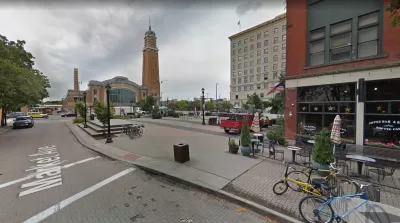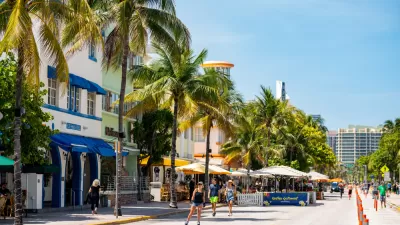In July, a local nonprofit closed down an entire street in the Ohio City neighborhood of Cleveland for a placemaking experiment that had to be partially dismantled before the three-month duration of the program was complete.

"The city may be having second thoughts about the temporary closure of Market Avenue in Ohio City, which has enabled the one-block street to function over the past month as a popular, tree-shaded park filled with colorful café tables and chairs," reports Steven Litt.
Safety concerns, however, led the city to remove the street furniture earlier this month. The nonprofit Ohio City Inc. had been granted a permit to close the street for three months. Apparently however, some city officials say that the street furniture was not part of the permit. "The city has asked Ohio City to present a safety plan showing how the furniture would be handled in case of an emergency," according to Litt.
"Ohio City pursued the street closure as a way to provide a new outdoor amenity for a rapidly growing neighborhood attracting new residents around bustling restaurants and shops near the West Side Market, the area’s traditional anchor," explains Litt, who also references a similar effort in the nearby city of Euclid, launched in 2018.
FULL STORY: Ohio City’s Market Avenue street furniture removed as Cleveland rethinks park plan

Planetizen Federal Action Tracker
A weekly monitor of how Trump’s orders and actions are impacting planners and planning in America.

Map: Where Senate Republicans Want to Sell Your Public Lands
For public land advocates, the Senate Republicans’ proposal to sell millions of acres of public land in the West is “the biggest fight of their careers.”

Restaurant Patios Were a Pandemic Win — Why Were They so Hard to Keep?
Social distancing requirements and changes in travel patterns prompted cities to pilot new uses for street and sidewalk space. Then it got complicated.

Platform Pilsner: Vancouver Transit Agency Releases... a Beer?
TransLink will receive a portion of every sale of the four-pack.

Toronto Weighs Cheaper Transit, Parking Hikes for Major Events
Special event rates would take effect during large festivals, sports games and concerts to ‘discourage driving, manage congestion and free up space for transit.”

Berlin to Consider Car-Free Zone Larger Than Manhattan
The area bound by the 22-mile Ringbahn would still allow 12 uses of a private automobile per year per person, and several other exemptions.
Urban Design for Planners 1: Software Tools
This six-course series explores essential urban design concepts using open source software and equips planners with the tools they need to participate fully in the urban design process.
Planning for Universal Design
Learn the tools for implementing Universal Design in planning regulations.
Heyer Gruel & Associates PA
JM Goldson LLC
Custer County Colorado
City of Camden Redevelopment Agency
City of Astoria
Transportation Research & Education Center (TREC) at Portland State University
Camden Redevelopment Agency
City of Claremont
Municipality of Princeton (NJ)





























